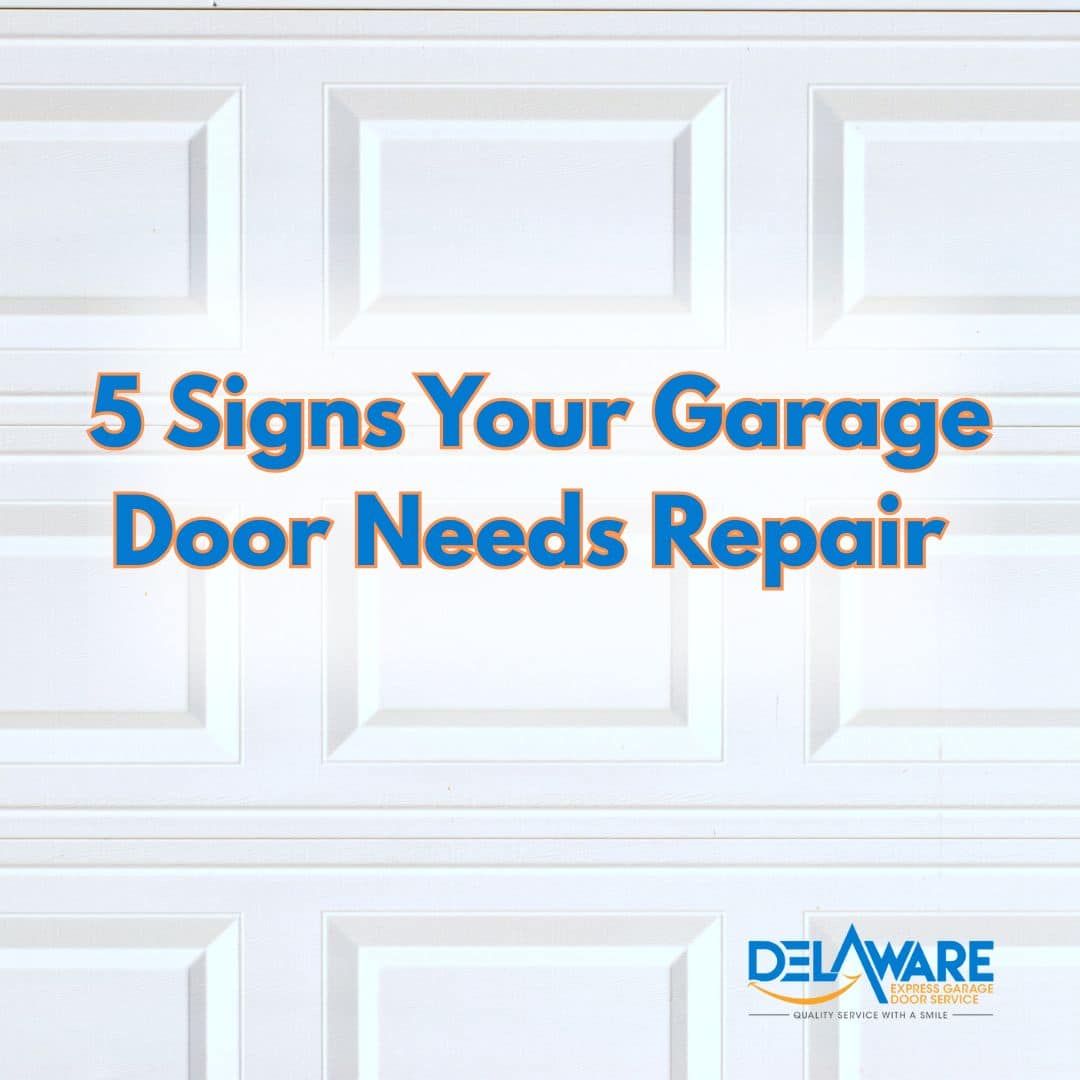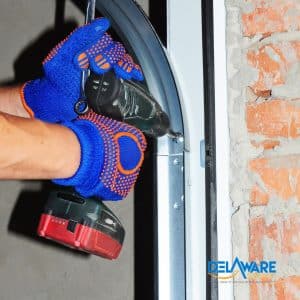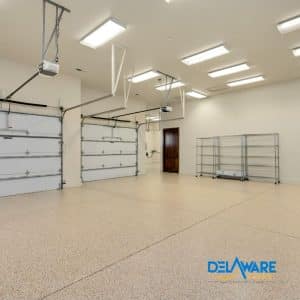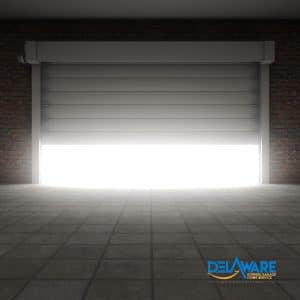
Most people take their garage door for granted until it stops working. And when it does, it’s usually not at a convenient time. Your garage door, much like your car, gives you warning signs before something goes seriously wrong. Brakes squeal. Wipers screech. Garage doors? They grind, wobble, stick, and crack. But too many homeowners ignore these signals, assuming their door will just keep doing its job, until it doesn’t.
At Delaware Express Garage Door Service, based in Wilmington, Delaware, we’ve seen it all: snapped cables, bent tracks, doors hanging sideways. The truth is, most of these emergencies could’ve been avoided with early repairs. And whether you’re in Wilmington or anywhere else in New Castle County, the warning signs are the same.
In this article, we’ll break down the top 5 signs that your garage door needs attention now, not after it breaks.
Because when your door quits, getting same-day service is hard. But catching a problem early? That’s smart. And it could save you a lot of money, time, and headaches down the road.
1. Your Garage Door Struggles to Open — It’s Not the Opener’s Job to Lift It
Most people think the garage door opener is the thing doing all the lifting. Wrong. The real workhorse is your garage door’s spring system. The opener is more like the guide, it just tells the door when to go. But if the door is getting heavy or jerky on the way up, your springs are probably losing tension or wearing out.
This is one of the earliest and most ignored signs of a bigger issue. Here’s why it matters:
Why This Is a Problem
If your door feels like it’s dragging or slow to respond, you’re not just dealing with a lazy motor. Springs are under high tension. When they’re weakened, your opener has to pick up the slack — and it’s not built for that. Over time, this can:
- Burn out your opener
- Snap a spring (which can be dangerous)
- Cause your door to slam shut or jam halfway
It’s the domino effect. One small issue causes another, and suddenly you’ve got a major failure on your hands.
How to Spot This Early
Start paying attention to how your garage door behaves when it opens. Here’s what to look for:
- Is the door slower than usual?
- Does it jerk or hesitate while lifting?
- Do you hear a grinding noise or a whining motor?
- Does the door feel heavier when opened manually?
These are signs your spring system isn’t doing its job, and your opener is compensating.
What You Should Do
Don’t wait until the opener fails or a spring snaps. A pro can inspect the spring tension and adjust or replace it before it becomes dangerous. At Delaware Express Garage Door Service, we fix this issue fast, with no upsells or fluff. Just what your door needs to get back to working like it should.
2. It Doesn’t Open or Close Smoothly — Or Quietly
Your garage door should open and close in one smooth, steady motion — and without sounding like a horror movie. If it starts jerking, shuddering, or screeching, that’s not “just how old doors sound.” That’s a system under stress. And it’s your early warning that something mechanical is misaligned, worn out, or ready to fail.
Noise = Neglect
Let’s be real: garage doors aren’t silent. But there’s a difference between a gentle hum and the kind of noise that makes your neighbors flinch. Grinding, scraping, popping, or high-pitched squeals are clear signals that something isn’t working right.
You wouldn’t ignore your car if it started making weird noises. Your garage door deserves the same attention.
Common Causes of Jerky or Noisy Operation
- Dry or dirty rollers
- They need lubrication. If they’re metal-on-metal, it’s friction city.
- Loose hardware
- Nuts and bolts loosen over time, which creates shaking and noise.
- Misaligned tracks
- If your tracks shift even slightly, your door can catch and jerk as it moves.
- Worn rollers
- Old rollers can develop flat spots or cracks, making the door drag.
When you hear or feel irregular motion, it’s not just annoying — it’s the sound of parts breaking down.
Why This Matters
If you ignore the rough motion and sounds, small issues like loose rollers can turn into big failures like a door that gets stuck, or worse, goes off-track. And once that happens? Now you’re calling for emergency repair and hoping a tech can get to you the same day. Spoiler: they usually can’t.
Real Talk: Prevention Saves Time and Money
At Delaware Express Garage Door Service, we always tell customers, the door wants to work well. But when it starts acting up, it’s asking for help. And the longer you wait, the more expensive the fix.
Think of it like this: tightening a few bolts and lubing the rollers? That’s a cheap, fast fix. Replacing a bent track and rehanging a door that popped out of place? That’s time-consuming, risky, and costs way more.

3. Roller Heads Are Wobbling — Side-to-Side Movement Is a Red Flag
When your garage door is running right, the rollers glide smoothly along the track, like a train on rails. But when those rollers start wobbling from side to side, that’s a huge warning. It means the door isn’t tracking straight. And when a 150+ lb door isn’t lined up right? That’s when damage, or even danger, shows up fast.
What’s Causing the Wobble?
The roller heads, the round parts that ride inside your door track, are built to roll vertically, not shift sideways. When you see or hear a roller rattling, bouncing, or visibly shaking, you’re looking at:
- Worn bearings inside the rollers
- Loose tracks
- Bent or warped roller stems
- Improper door alignment
This doesn’t just look off — it throws off your entire system.
Why This Can’t Be Ignored
A shaky roller might not seem like a big deal. But here’s the Hormozi-style truth: it’s a weak point in a heavy, moving object. When one roller goes rogue, the rest of the door starts compensating — pulling weight in weird directions, grinding against the track, or popping out entirely.
That’s how people end up with:
- Doors that derail
- Bent tracks
- Jammed systems
- Emergency service calls that cost 5x more than a basic repair
If your garage door rollers are dancing side-to-side, it’s not a “maybe later“ issue, it’s a “fix this now“ situation.
What Delaware Express Can Do
Our techs can spot roller issues in minutes. We inspect alignment, tighten loose hardware, and replace worn rollers with precision-fit parts that run smooth and quiet. Most fixes are same-day (when caught early). And no, we won’t sell you a new door unless you actually need one.
4. Fraying Cables — A Small Issue That Can Snap Into a Big One
Your garage door’s cables are like its Achilles’ heel. They may look small, but they carry a massive amount of tension and weight. These cables work together with the springs to control the door’s motion safely and evenly.
If those cables start to fray, you’re one bad day away from a snapped line — and a 150+ pound door slamming shut with no warning.
What Does “Fraying“ Look Like?
Fraying is when you see tiny wires sticking out of the main cable line — kind of like when the threads on an old rope start unraveling. A few strands might not seem like a crisis, but it’s a clear sign the cable is weakening. And when enough of those strands break, the cable goes from “functional“ to “failed“ — in seconds.
Why This Is Serious (No Fluff)
Garage door cables don’t give you second chances. When one breaks, the door can drop unevenly or completely fall off its track. That’s a major safety hazard, especially if someone is nearby.
Here’s what happens when a frayed cable finally gives out:
- The door slams closed hard, possibly damaging the door or floor.
- One side of the door drops faster than the other, bending panels or jamming the track.
- Your opener gets stressed or even damaged trying to compensate.
And worst of all? There’s no warning when it actually snaps. That’s why catching the fraying stage is so important.
How Delaware Express Handles It
We inspect and replace cables before they reach a danger point. If we see fraying or wear, we’ll show you exactly what’s going on, no fear tactics, just facts. We carry high-strength cables rated for your door’s exact weight, and we install them with precision to avoid premature wear.
Pro tip: Never try to fix or replace garage door cables yourself. The tension can be lethal without the right tools and know-how.

5. Cracked Panels — Weak Spots That Will Eventually Buckle
Let’s talk about something most homeowners shrug off: cracks in your garage door panels. Maybe it’s a small line near the corner. Maybe one section has started to bow slightly. No big deal, right?
Wrong.
Cracked panels are like fractured bones in your garage door. Sure, the whole system still works, for now. But those weak spots will spread, buckle, and fail under pressure. And once that happens, you’re no longer looking at a repair, you’re looking at a full panel or door replacement.
Why Do Panels Crack?
Garage door panels are under constant stress. Every time the door opens or closes, those panels flex slightly. Over time, things like:
- Sun exposure
- Minor impacts (like from a basketball or bike)
- Age and weather
- Loose fasteners or frame tension
…can cause the material to split, bow, or crack.
And once a panel is compromised, the structural integrity of your entire door is at risk.
What Happens When You Ignore It
A cracked panel doesn’t just look bad. It throws off the door’s balance and alignment, which causes the rollers to bind and the tracks to twist. Over time, one cracked panel leads to:
- Bending or folding under pressure
- Door jamming during movement
- Extra strain on the opener and spring system
- Complete panel collapse inside the track
You might go from “my door has a little crack“ to “my door won’t close“ in a single use.
Why Most People Miss This Sign
It’s easy to ignore because your door might still work fine — until one day it doesn’t. And then it’s not just about fixing a crack. Now you’re calling to ask if we can custom-order a replacement panel or install a whole new door because that model is discontinued.
How Delaware Express Can Help
We’re all about saving you time and money. Catching a cracked panel early means we might be able to reinforce it, resecure it, or replace just that section. Wait too long, and the fix gets a lot more complicated and expensive.
Our team checks panel integrity during every service call, and we’ll always tell you honestly if it’s a cosmetic issue or a structural one. No guesswork.

Conclusion: Your Garage Door Is Talking — Are You Listening?
Your garage door doesn’t just fail out of nowhere. It whispers — then it screams. The signs are always there:
- It strains when opening.
- It jerks and rattles.
- The rollers wobble.
- The cables fray.
- The panels crack.
Most people ignore these warnings. And then they act surprised when the door won’t open and they’re stuck waiting days for emergency service. But it doesn’t have to be that way.
At Delaware Express Garage Door Service, we believe in prevention over panic. Spotting these issues early isn’t just smart, it’s how you avoid the high cost, inconvenience, and risk of a total failure. Think of it like taking care of your car: regular tune-ups beat surprise breakdowns every time.
So if your garage door is acting up, don’t wait for it to quit. Call us. Let’s fix the little stuff now, before it becomes the big stuff later.










